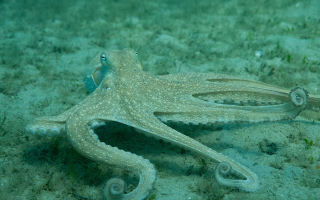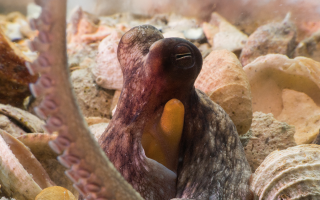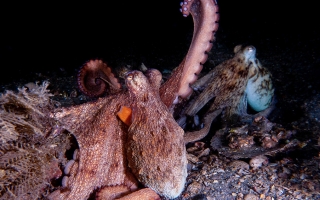Full Name
Roger Hanlon
Title
Senior Scientist

- Email:
- Phone:
- Fax:
- CV:
- ORCID ID:
0000-0003-0004-5674
M.S. Marine Science, RSMAS, University of Miami, 1975
B.S. Biology, Florida State University, 1969
Roger Hanlon is an ethologist with particular emphasis on sensory ecology of cephalopods (octopus, squid, cuttlefish, nautilus). A central focus is on the form and function of Rapid Adaptive Coloration, which is a neurally controlled system utilized in many aspects of camouflage and communication. Field studies and complementary laboratory experiments are conducted to address specific questions related to sensory perception and behavioral ecology. A main interest is in dynamic camouflage: (1) from the sensory side, determining the visual algorithm that guides pattern choice and ultrafast change (<1sec); and (2) from the behavioral side, quantifying camouflage pattern types and how they are perceived by a wide range of visual predators (fishes, marine mammals, diving birds). Discovering the neural and dermal mechanics of color change has led to collaborations with materials scientists and engineers to develop new classes of materials that change appearance based on the pigments and reflectors in cephalopod skin. This bio-inspired approach to engineering involves various high-tech and emerging technologies such as advanced microscopy instrumentation, spectrometers, HyperSpectral Imagers, autonomous underwater vehicles, and so forth. Other behavioral studies involve aspects of sexual selection signaling during male-male agonistic bouts, as well as cognitive skills such as spatial memory and episodic-like memory and how they relate to cephalopod ecology.
Bogdanov, G.1†, Strzelecka, A.A.1†, Kaimal, N.1, Senft, S.L.2, Hanlon, R.T.2, Alon A. Gorodetsky1 2025. Gradient refractive indices enable squid structural color and inspire multispectral materials. Science 388: 1389-1395.
Gendreau, A., Boucaud, C., Buresch, K.B., Rooney, S., Morris, H., Hanlon, R.T. 2025. How octopuses use and recruit additional arms to find and manipulate visually hidden items. Biology Open 14 (7): bio062011. http://doi.10.1242/bio062011
Bennice, C.B., Buresch, K.C., Grossman, J., Morano, T. & Hanlon, R.T. 2025. Octopus arm flexibility facilitates complex behaviors in diverse natural habitats. Scientific Reports 15: 31875.
Buresch, K.B., Huget, N.D., Brister, W.C, Zhou, E.Y., Lineaweaver, A.S., Rifai, C., Hu, J., Stevenson, Z.E., Boal, J.G. and Hanlon, R.T. 2024. Evidence for tactile 3D shape discrimination by octopus. J Comp Physiol A 210: 815-823. https://doi.org/10.1007/s00359-024-01696-4
Bower, D.Q., Senft, S.L., Hanlon, R.T., and Deravi, L.F. 2024. Pigment granule architecture varies across yellow, red and brown chromatophores in squid Doryteuthis pealeii. Scientific Reports 14: 31417. https://doi.10.1038/s41598-024-83021-2
Schnell, AK, Boeckle M., Rivera M., Clayton NS., Hanlon, RT. 2021. Cuttlefish exert self-control in a delay of gratification task. Proceedings of the Royal Society B. 288: 20203161. https://doi.org/10.1098/rspb.2020.3161
Williams, TL, Senft SL, Yeo, J, Martin-Martinez, FJ, Kuzirian AM, Martin CA, DiBona CW, Chen, C-T, Dineen SR, Nguyen HT, Gomes CM, Rosenthal, JJC, MacManes MD, Chu, F, Buehler MJ, Hanlon, RT, Deravi, LF. 2019. Dynamic pigmentary and structural coloration within a cephalopod chromatophore organ. Nature Communications 10: 1004.
Chubb, C., Chiao, C.-C., Ulmer, K., Buresch, K., Birk, M. and Hanlon, R.T. 2018. Dark scene elements strongly influence cuttlefish camouflage responses in visually cluttered environments. Vision Research 149: 86-101.
Hanlon, R.T.; Messenger, J.B. 2018. Cephalopod Behaviour. 2nd edition. Cambridge University Press. 365pp.
Pikul, J.H., Li, S., Bai, H., Hanlon, R.T., Cohen, I. and Shepherd, R.F. 2017. Stretchable surfaces with programmable 3-D texture morphing for synthetic camouflaging skins. Science 358: 210-214.
Crook, R.J., Dickson, K., Hanlon, R.T. and Walters, E.T. 2014. Nociceptive sensitization reduces predation risk. Current Biology 24: 1121-1125.
Chiao, C-C, Wickiser, J.K., Allen, J.J., Genter, B. and Hanlon, R.T. 2011. Hyperspectral imaging of cuttlefish camouflage indicates good color match in the eyes of fish predators. Proceedings of the National Academy of Sciences 108 (22): 9148-9153.
Hanlon RT, Chiao CC, Mäthger, LM., Barbosa A, Buresch KC and Chubb, C. 2009. Cephalopod dynamic camouflage: bridging the continuum between background matching and disruptive coloration. Philosophical Transactions of the Royal Society B 364: 429-437.
Hanlon, R.T. 2007. Cephalopod dynamic camouflage. Current Biology 17 (11): R400-R405.







